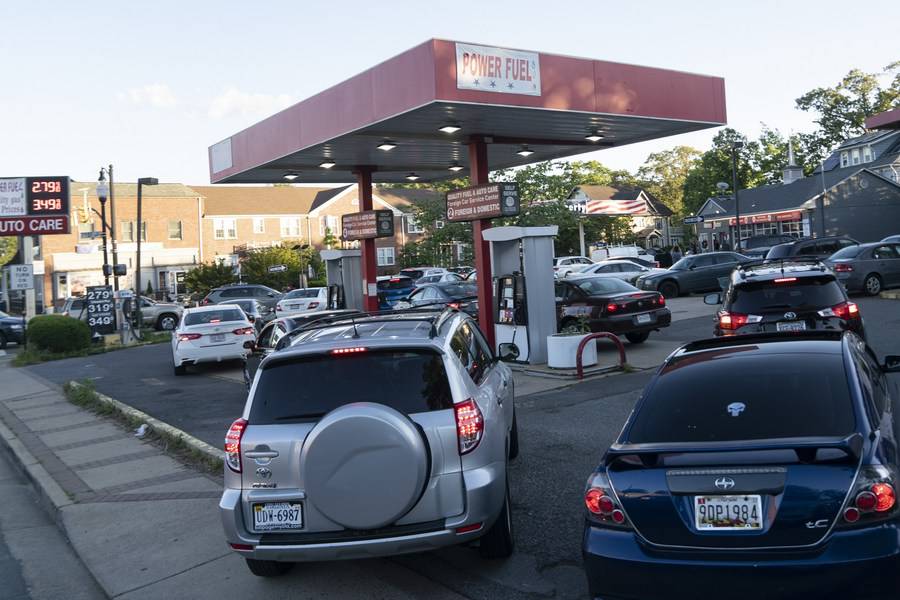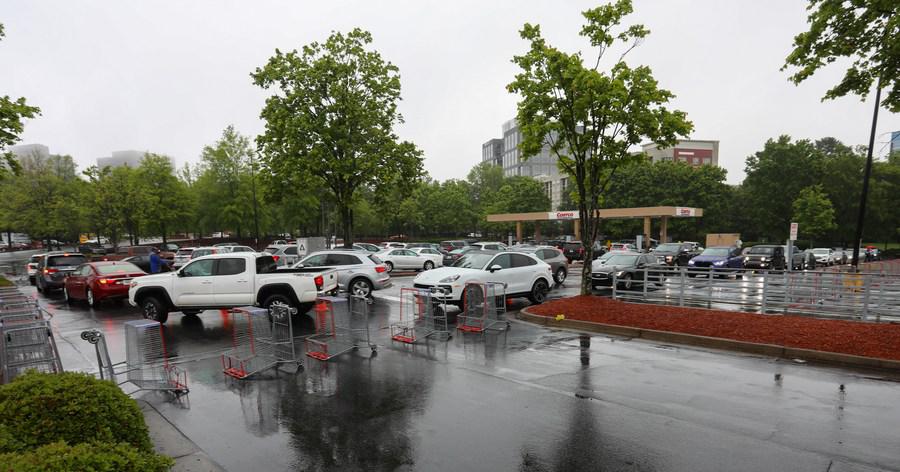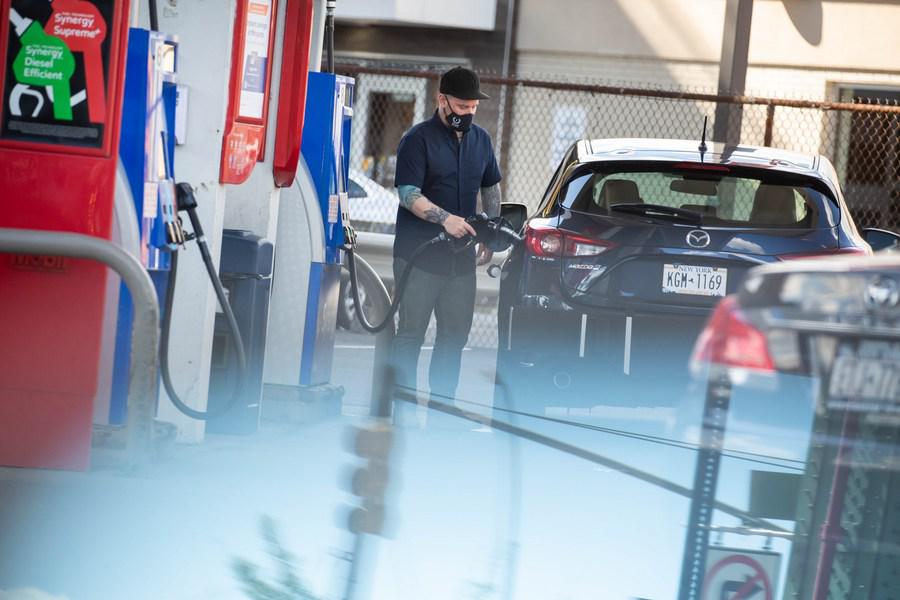Panic buying prolongs fuel shortages in southeastern U.S.

Cars line up for fuel at a gas station in Arlington, Virginia, the United States, May 12, 2021. (Xinhua/Liu Jie)
"The crisis was man-made -- first by the ransomware attack on the systems of Colonial Pipeline that led the company to shut down its pipeline connecting Texas to New Jersey, then by a panic that led drivers to fill up out of fear the country could run out of gas," says The Washington Post.
WASHINGTON, May 13 (Xinhua) -- Fuel shortages caused by the shutdown of a major pipeline over a ransomware attack last week in the southeastern United States have been exacerbated by panic buying and hoarding, and the scenario is not expected to turn for the better soon as the pipeline was restarted Wednesday afternoon but will takes days to resume full operation.
"Long lines, sharp words and pumps gone dry greeted unhappy drivers from the Alabama foothills to the Chesapeake Bay" across the eastern half of the country, and "nervous drivers clogged gas stations and created shortages in parts or all of 11 states," reported The Washington Post on Thursday.
At least 12,000 gas stations reported being completely empty, and the squeeze pushed the price of a gallon past 3 U.S. dollars, its highest in years, it added.
The pipeline shutdown and ensuing gas search are "causing several thousand gas stations across the nation to run out of fuel. Hundreds of others are limiting sales," reported The New York Times on Thursday.
"Consumers have become gripped by a fear that there could be a gas shortage. Many have turned to social media to vent, posting videos and pictures of long lines and empty pumps at filling stations," it added.

Cars line up for fuel at a gas station in Atlanta, Georgia, the United States, May 12, 2021. (Photo by XiaoHeng Wang/Xinhua)
WIDE-SPREADING SHORTAGES
U.S. Secretary of Energy Jennifer Granholm told a White House press briefing on Tuesday that the current supply crunch was in the areas that were affected by the pipeline, predominantly the Southeast, such as the states of North Carolina, South Carolina, Tennessee, Georgia, and southern Virginia.
"The crisis was man-made -- first by the ransomware attack on the systems of Colonial Pipeline that led the company to shut down its pipeline connecting Texas to New Jersey, then by a panic that led drivers to fill up out of fear the country could run out of gas," said the Post.
"The long lines of frustrated drivers were the latest reminder of a country vulnerable to shocks and recalled the queues outside food banks, coronavirus testing centers and grocery stores over the past year," it added.
In North Carolina, 65 percent of stations were out of gas Wednesday afternoon, according to GasBuddy, an app that tracks fuel prices and demand. More than 43 percent were out in Georgia, South Carolina and Virginia.
The panic was so contagious that gas stations in central Florida, an area not supplied by the Colonial Pipeline, were also running out of fuel. Governors in Virginia, North Carolina, Georgia and Florida have declared states of emergency.
The 5,500-mile pipeline system transports more than 100 million gallons of gasoline, diesel, jet fuel and heating oil per day, or roughly 45 percent of fuel consumed on the Eastern Seaboard between the Gulf Coast and the New York metro area.

A person pumps gas at an ExxonMobil gas station in the Brooklyn borough of New York, the United States, on May 12, 2021. (Xinhua/Michael Nagle)
CALM NEEDED
Officials in states with the longest gas lines are asking for calm. "I'm urging everyone to be careful and be patient," South Carolina's attorney general, Alan Wilson, was quoted by the Times as saying.
"Remember when it wasn't a good idea to panic buy toilet paper last year? Please don't do it with gas now," the Virginia Department of Emergency Management tweeted on Wednesday.
The Colonial Pipeline Company, operator of the pipeline carrying gasoline and diesel fuel to U.S. east and southeast parts, said that it initiated the restart process of its transportation system at approximately 5 p.m. ET on Wednesday, almost six days after its shutdown.
"Following this restart, it will take several days for the product delivery supply chain to return to normal. Some markets served by Colonial Pipeline may experience, or continue to experience, intermittent service interruptions during the start-up period," said the company. "Colonial will move as much gasoline, diesel, and jet fuel as is safely possible and will continue to do so until markets return to normal."
The Joe Biden administration approved a temporary waiver of shipping requirements late Wednesday to help Colonial Pipeline transport fuel. The waiver "will enable the transport of additional gas and jet fuel between the Gulf Coast and East Coast ports to ease supply constraints," White House Press Secretary Jen Psaki said in a statement early Thursday.
Meanwhile, President Joe Biden signed an executive order on Wednesday aimed at strengthening U.S. cybersecurity defenses, a move that follows a series of sweeping cyberattacks on private companies and federal government networks over the past year.
"My administration will be pursuing a global effort of ransomware attacks by transnational criminals who often use global money-laundering networks to carry them out," said the president on Monday.
Photos
Related Stories
- Pipeline breakdown leads to urgent issues for Biden administration
- Ouster of anti-Trump Cheney from House GOP leadership may deepen party's division
- Anti-Trump Cheney removed from House Republican leadership
- U.S. energy secretary urges Americans not to hoard gasoline amid pipeline cyber attack
- U.S. jobs report underscores value of Fed's patient policy approach: official
Copyright © 2021 People's Daily Online. All Rights Reserved.










